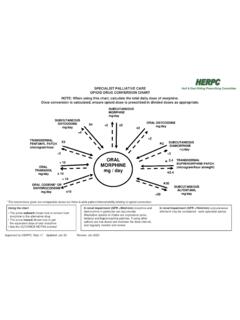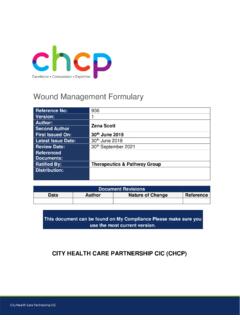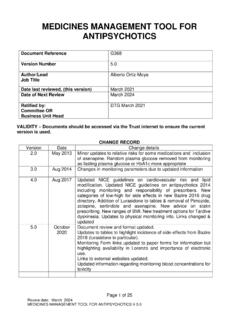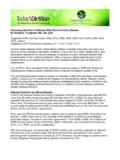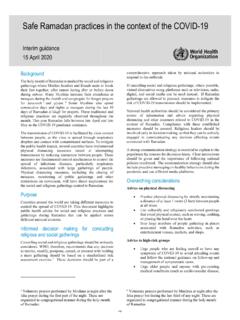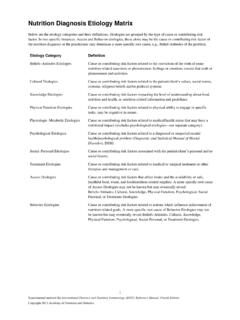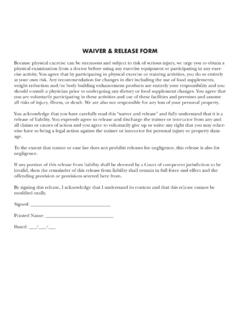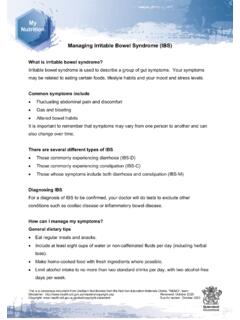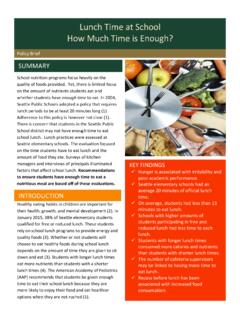Transcription of Post-Discharge Bariatric Information Leaflet For General ...
1 1 Hull University Teaching Hospitals NHS Trust Post-Discharge Bariatric Information Leaflet For General Practitioners and Patients British Obesity & Metabolic Surgery Society (BOMSS) 2 Introduction 3 Impact of surgery on nutrition 3 Post-operative nutritional supplementation (routine) 4 Post-operative blood monitoring 5 Emergency Department management of Bariatric patients 6 Top 10 tips for General practitioners 7 Healthy eating long term after weight loss surgery 8 CONTENTS 3 Your patient has now been discharged from the Tier 4 Bariatric Surgery Pathway; the Information provided in this Leaflet is to assist General Practitioners in the ongoing management of patients following Bariatric surgery. Within this Leaflet abstracts have been taken from the British Obesity & Metabolic Surgical Society website and Royal College of General Practitioners website highlighting the relevant guidelines required to safely monitor patients post Bariatric surgery.
2 Hull University Teaching Hospital Trust s policy recommends that your patient will require the following supplementary medications for life: Calcium with Vitamin D Multivitamins with minerals Vitamin B12 Iron (may or may not be required we recommend monitoring ferritin level) Your patient will require the following blood tests ( Bariatric blood profile) annually around the time of the month of their operation. Full Blood Count Biochemical Profile (U&E s and LFT s) Vitamin D Ferritin Folate B12 HbA1c (if a patient had a history of diabetes) For further Information , please see guidelines and advice extracted from the Royal College of General Practitioners and British Obesity and Metabolic Surgery Society within this Leaflet . For more in-depth Information please access the internet links provided in the appendices at the end of this Leaflet . The main Bariatric surgery procedures are the gastric band, gastric bypass and sleeve gastrectomy with the duodenal switch being less frequent.
3 In the initial stages after surgery, patients are advised to start on a liquid diet , before progressing onto pureed food, soft food and then more normal textured food. At two years, the patient should be able to manage a wide range of textures of foods but may still report difficulties with some. It should not be assumed that all patients are eating a well balanced diet . Hopefully many will be however some may have maladaptive eating behaviours resulting in a poor nutritional intake. Extract taken from British Obesity & Metabolic Surgical Society GP Guidance: Management of nutrition following Bariatric surgery (please see appendices for link) Table 1: Extracted from British Obesity & Metabolic Surgical Society GP Guidance: Management of nutrition following Bariatric surgery (please see appendices for link) Surgical procedure Impact on nutrition Gastric band No impact on absorption. Over tight gastric band affects nutritional quality of diet including protein and iron Sleeve gastrectomy May be some impact on absorption including iron and vitamin B12 Gastric bypass Impacts on absorption of iron, vitamin B12, calcium and vitamin D Long limb bypasses may affect absorption of protein, fat, vitamin A and trace elements in addition Duodenal switch Impacts on absorption of protein, fat, calcium, fat soluble vitamins A, D, E and K, zinc IMPACT OF SURGERY ON NUTRITION INTRODUCTION 4 As nutrition is compromised with Bariatric surgery, it is recommended that patients take nutritional supplements lifelong in addition to having a balanced diet .
4 It is important that compliance with supplements is checked regularly. Table 2 shows the usual recommended nutritional supplements, but it should be noted that patients may have different requirements. Although patients who have a gastric band should be able to eat a nutritionally balanced diet , many will be advised to routinely take a multivitamin and mineral supplement. The patient s Bariatric centre should provide full details of the patient s nutritional requirements and supplements. For further Information , please refer to the British Obesity and Metabolic Surgery Society (BOMSS) guidelines (O Kane et al 2014). Extract taken from British Obesity & Metabolic Surgical Society GP Guidance: Management of nutrition following Bariatric surgery (please see appendices for link) Surgical procedure Nutritional supplement Sleeve Gastrectomy Gastric bypass Duodenal switch Multivitamin and mineral Yes Yes Yes Iron Yes Yes Yes Folate As part of multivitamin and mineral As part of multivitamin and mineral As part of multivitamin and mineral Vitamin B12 Yes (1) Yes Yes (1) Calcium and vitamin D Yes Yes Yes Zinc and copper As part of multivitamin and mineral As part of multivitamin and mineral As part of multivitamin and mineral.
5 Additional may be needed Selenium As part of multivitamin and mineral As part of multivitamin and mineral As part of multivitamin and mineral Additional fat soluble vitamins No No Yes (1) May be variation between centres as to whether routine supplementation with vitamin B12 following the sleeve gastrectomy or duodenal switch Table 2: Extracted from British Obesity & Metabolic Surgical Society GP Guidance: Management of nutrition following Bariatric surgery (please see appendices for link) Iron may or may not be required. We recommend monitoring ferritin POST-OPERATIVE NUTRITIONAL SUPPLEMENTATION (ROUTINE) 5 Continued nutritional monitoring is essential following Bariatric surgery to ensure that patients do not develop nutritional problems in the longer term. It must be not assumed however that abnormal blood results are always directly related to the surgery itself. Table 3 shows the recommended blood tests which should be done annually as a minimum for the sleeve gastrectomy, gastric bypass and duodenal switch.
6 Following the gastric band, if there is any suspicion that the patient is not adhering to a nutritionally balanced diet , appropriate blood tests should be done. Surgical procedure Blood tests Sleeve Gastrectomy Gastric bypass Duodenal switch Liver function tests Yes Yes Yes Full Blood Count Yes Yes Yes Ferritin Yes Yes Yes Folate Yes Yes Yes Vitamin B12 Yes (1) Yes (1) Yes (1) Calcium Yes Yes Yes Vitamin D Yes Yes Yes Parathyroid hormone Yes Yes Yes Vitamin A No Possibly (2) Yes Zinc, copper Possibly (3) Yes (3) Yes (3) Selenium No (3, 4) No (3, 4) No (3, 4) (1) If patient is having three monthly intramuscular injections of vitamin B12, there may be no need for annual checks (2) If the patient has a long limbed bypass, symptoms of steatorrhoea or night blindness (3) Measure when concerns for example, if screening for iron deficiency anaemia is negative, hair loss, pica, neutropaenia (4) Measure when concerns for example, cardiomyopathy, chronic diarrhoea Table 3: Extracted from British Obesity & Metabolic Surgical Society GP Guidance.
7 Management of nutrition following Bariatric surgery (please see appendices for link) Alternatively oral Cyanocobalamin 1mg once daily can be prescribed as an alternative to Vitamin B12 injections. The Bariatric Service recommends annual Vitamin B12 blood tests POST-OPERATIVE BLOOD MONITORING 6 The following poster has been developed as an aid for initial assessment and management of a Bariatric surgery patient presenting to the emergency department or acute assessment unit. Operation types: Gastric Band, Gastric Bypass, Sleeve Gastrectomy Presentation This may signify Action Total Dysphagia Acute band slippage (herniation) may require emergency surgery for gastric ischaemia even in apparently well patients A GI Bleed Anastomotic bleed, marginal ulcer. May not be accessible at endoscopy post bypass procedures may need surgery A Intestinal Obstruction Anastomotic stricture, internal hernia or port site hernia A Chest pain, Tachycardia, Breathlessness Pulmonary embolus, myocardial infarction, gastric pouch problems, anastomotic leak B Abdominal pain Sub-acute obstruction from internal hernia, anastomotic leak B Reflux symptoms, no dysphagia to fluids Band slip, gastrojejunal stenosis C Port site infection in band patient Gastric band erosion/infected band C Action A Urgent Referral for band deflation and surgery if appropriate B Initial investigations as appropriate.
8 CT may be impossible or misleading. Early discussion with surgical team advisable C Treat appropriately, urgent Bariatric appointment Remember Bariatric patients have non- Bariatric problems Abdominal peritonism may be less apparent in obese patients Do NOT insert a nasogastric tube Basic surgical principles apply regardless of patient size Gastric Bypass patients with prolonged vomiting, thiamine deficiency may develop in a few days. Please prescribe Pabrinex and Vitamin B complex to prevent potentially irreversible neurological deficit If your patient has any further complications they can be re-referred back to the Bariatric Service. Table 4: Extracted from British Obesity & Metabolic Surgical Society Guidelines (please see appendices for link) EMERGENCY DEPARTMENT MANAGEMENT OF Bariatric PATIENTS 7 Please see below the ten top tips for the management of patients post Bariatric surgery in primary care extracted from the Royal College of General Practitioners for further Information please access the internet link provided in the appendices.
9 Ten top tips for the management of patients post Bariatric surgery in primary care 1. Keep a register of Bariatric surgery patients and record the type of procedure in the register. Please note that follow up varies according to the type of surgery. 2. Encourage patients to check their own weight regularly and to attend an annual BMI and diet review with a health professional. 3. Symptoms of continuous vomiting, dysphagia, intestinal obstruction (gastric bypass) or severe abdominal pain require emergency admission under the local surgical team. 4. Continue to review co-morbidities post surgery such as diabetes mellitus, hypertension, hypercholesterolaemia and sleep apnoea, as well as mental health. 5. Review the patient s regular medications. The formulations may need adjusting post-surgery to allow for changes in bio-availability post surgery. 6. Bariatric surgery patients require lifelong annual monitoring blood tests, including micronutrients.
10 Encourage patients to attend for their annual blood tests. 7. Be aware of potential nutritional deficiencies that may occur and their signs and symptoms. In particular, patients are at risk from anaemia and vitamin D deficiency, as well as protein malnutrition and other vitamin and micronutrient deficiencies. If a patient is deficient in one nutrient, then screen for other deficiencies too. 8. Ensure the patient is taking the appropriate lifelong nutritional supplements required post surgery as recommended by the Bariatric centre. Ensure guidance regarding vitamin supplementation has been issued by the Bariatric surgery team. Request a copy for the patient s GP records if this has not been included in the discharge Information . 9. Discuss contraception ideally pregnancy should be avoided for at least 12-18 months post surgery. 10. If a patient should plan or wish to become pregnant after Bariatric surgery, alter their nutritional supplements to one suitable during pregnancy.
